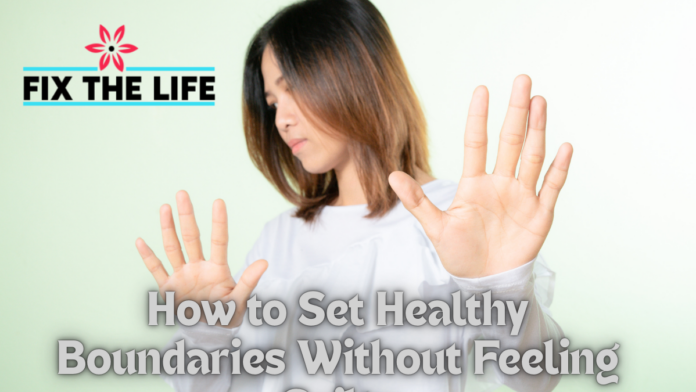Many people struggle with setting boundaries because they’re afraid of disappointing others, being judged, or coming across as selfish. But the truth is — setting boundaries isn’t about pushing people away. It’s about protecting your mental health, emotional balance, and personal peace.
If you often find yourself overcommitting, people-pleasing, or saying yes when you want to say no, it’s time to learn how to set healthy boundaries without guilt. This guide will show you how to honor your needs with confidence, kindness, and clarity.
Why Boundaries Matter for Emotional Balance
Boundaries act like invisible fences for your time, energy, and emotions. They help define what’s acceptable for you and what isn’t, keeping relationships respectful and balanced. Without boundaries, you’re more likely to feel drained, resentful, or overwhelmed.
Example: If a coworker constantly messages you after hours and you keep responding, you’ll likely start feeling frustrated — not just at them, but at yourself for allowing it. Setting a clear limit on your availability protects both your peace and your professional relationship.
1. Recognize Your Limits and Triggers
The first step in learning to set healthy boundaries is knowing what drains you or makes you uncomfortable. Pay attention to moments when you feel irritated, anxious, or resentful — these are signs your boundaries are being crossed.
Pro Tip: Make a list of situations or behaviors that regularly stress you out, whether it’s unsolicited advice, working weekends, or last-minute favors. Knowing your triggers helps you create boundaries before you reach a breaking point.
2. Communicate Clearly and Calmly
Setting boundaries isn’t about confrontation; it’s about communication. Be direct, kind, and firm when expressing your needs. Avoid over-explaining or apologizing for how you feel.
Example: If a friend frequently shows up unannounced, you might say: “I value our time together, but I need a heads-up before visits. Can you text first?”
Clear boundaries prevent misunderstandings and foster healthier connections.
3. Let Go of Guilt With Self-Respect Tips
It’s common to feel guilty when setting boundaries, especially if you’re used to prioritizing others’ needs over your own. Remember: protecting your time and well-being isn’t selfish — it’s necessary.
Happiness Tip: Shift your mindset by reminding yourself that saying no to others means saying yes to your mental health. One of the best self-respect tips is to treat yourself with the same kindness and understanding you offer others.
4. Be Consistent and Follow Through
A boundary only works if you enforce it. If you set a limit but fail to maintain it, people will continue crossing it — not because they’re cruel, but because you’ve allowed it.
Pro Tip: Stay consistent, even if it feels uncomfortable at first. The people who respect you will adjust. Those who don’t weren’t honoring you to begin with.
5. Prioritize Emotional Balance Over People-Pleasing
People-pleasing can feel like the easier option in the moment, but it often leads to long-term resentment and burnout. Choosing to set boundaries is a form of emotional self-care that protects your energy.
Example: If you’re asked to take on an extra project when you’re already overloaded, respond with: “I appreciate the opportunity, but I need to focus on my current priorities.”
Your well-being deserves to come first.
FAQ
Q1: Why do I feel guilty for setting boundaries?
A: Guilt often stems from wanting to be liked or fearing conflict. It’s a learned response, but it can be unlearned by prioritizing your well-being.
Q2: How do I know when it’s time to set a boundary?
A: Notice how you feel. If you often feel anxious, resentful, or overwhelmed in certain situations or relationships, it’s time to set a boundary.
Q3: What’s a polite way to say no without offending someone?
A: Be direct but kind. For example, “I appreciate the invite, but I’m going to pass this time.” No lengthy explanation needed.
Q4: Can setting boundaries damage relationships?
A: Healthy relationships respect boundaries. If someone resists your limits, it reveals a lack of respect, not a flaw in your boundary.
Q5: How do I maintain emotional balance while setting tough boundaries?
A: Practice self-care, journal your feelings, and remind yourself of the benefits of protecting your peace. Emotional balance improves with practice.
Final Thoughts
Setting boundaries isn’t about keeping people out — it’s about protecting what matters most: your mental health, emotional balance, and self-respect. Use these strategies to set healthy boundaries without guilt and watch how your confidence, peace, and relationships transform.




